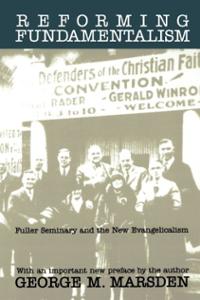Fuller Seminary’s Departure from Inerrancy


A significant number of my books were gifts from a retired dairy farmer in Ontario, Gilbert Zekveld. Following his retirement and especially after the death of his wife, Gilbert spent a lot of time reading and studying and translating Dutch books into English. He contacted me after I reviewed one of the books he translated and we became good friends — especially since he lived just down the road from us in Hamilton.
One of the books I received from Gilbert was George Marsden’s history of Fuller Seminary, Reforming Fundamentalism: Fuller Seminary and the New Evangelicalism. I finally got around to reading it over the last number of weeks. As I was reading it, I was thinking: why would Gilbert buy and read this book? What would interest him in this book? Since he’s now with the Lord, I can’t ask him directly anymore. But he did leave a lot of notes in the book that give some clues.
Gilbert spent much of his life in the Christian Reformed Church. Many of the books I received from him bear the evidence of that — there are CRC bulletins scattered through many of them. However, like many others in the 1960s and 1970s, Gilbert became concerned about the direction the CRC was taking, especially in regards to how it considered the authority of Scripture. This would later bear fruit in decisions made by the CRC on women in office. Gilbert eventually left the CRC because of these concerns.
But how does that connect to Fuller Seminary? Well, Fuller started off as a fundamentalist institution with very strict views on the nature and authority of Scripture. In the first decade of its existence, and probably also into its second, the notion that women could serve in ecclesiastical offices would have found no home at Fuller. However, all of that began to change significantly in the 1960s. By the early 1980s, nearly 20% of the M.Div. students at Fuller were women. In some ways, the trajectory followed by Fuller is the same as that followed by the CRC and Marsden does mention some direct connections between Fuller and the CRC. I think that’s why Gilbert Zekveld was interested in this book.
Harold Lindsell was deeply involved with the early history of Fuller. However, in the 1970s, he was greatly troubled by the direction that Fuller had taken and was vocal about his concerns. In his 1976 book Battle for the Bible he wrote:
“Down the road, whether it takes five or fifty years, any institution that departs from belief in an inerrant Scripture will likewise depart from other fundamentals of the faith and at last cease to be an evangelical institution in the historical meaning of that term. This is the verdict of history.” (quoted by Marsden, 277).
Whether it’s the CRC or Fuller or ourselves, when one starts tinkering with the doctrine of Scripture, there are serious consequences. That’s why it’s important for us to be confessional churches. The Reformed confessions, when subscribed and believed seriously, keep us anchored to a biblical view of the Bible.
(The above was first posted on the old Xanga Yinkahdinay on January 15, 2009)


